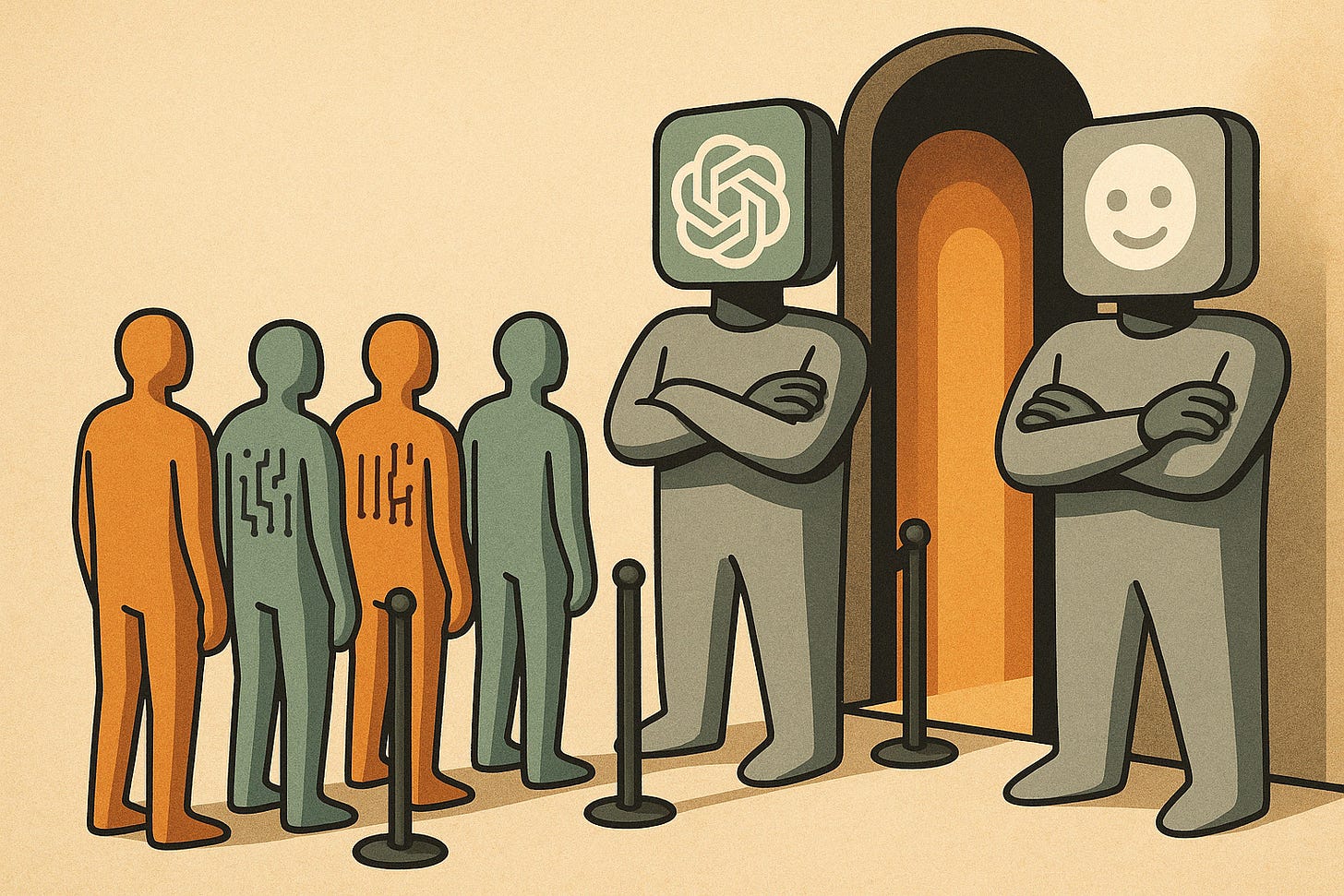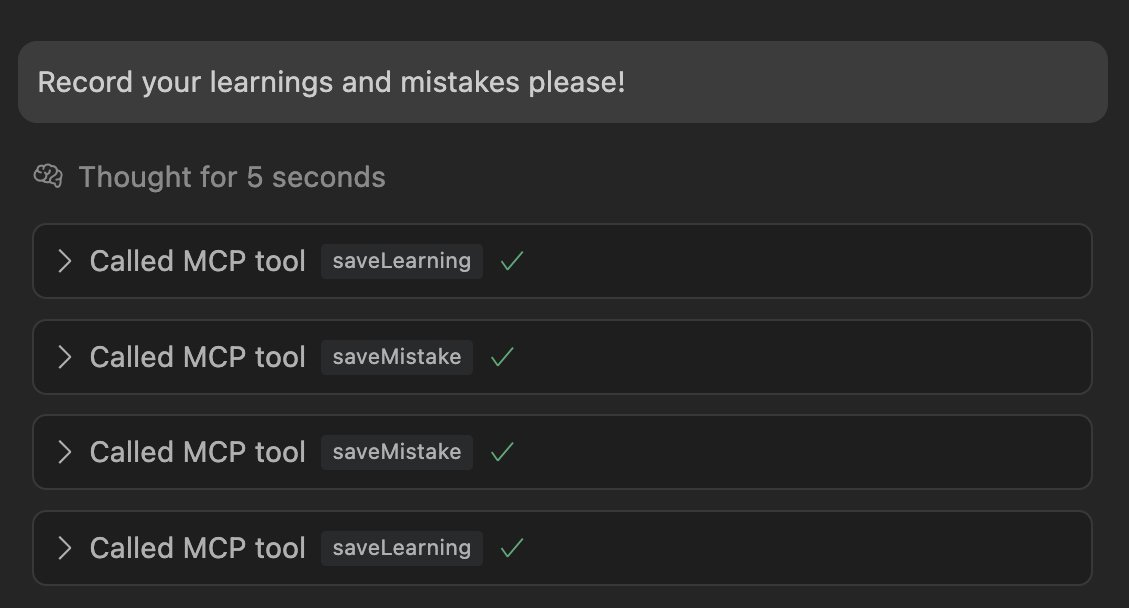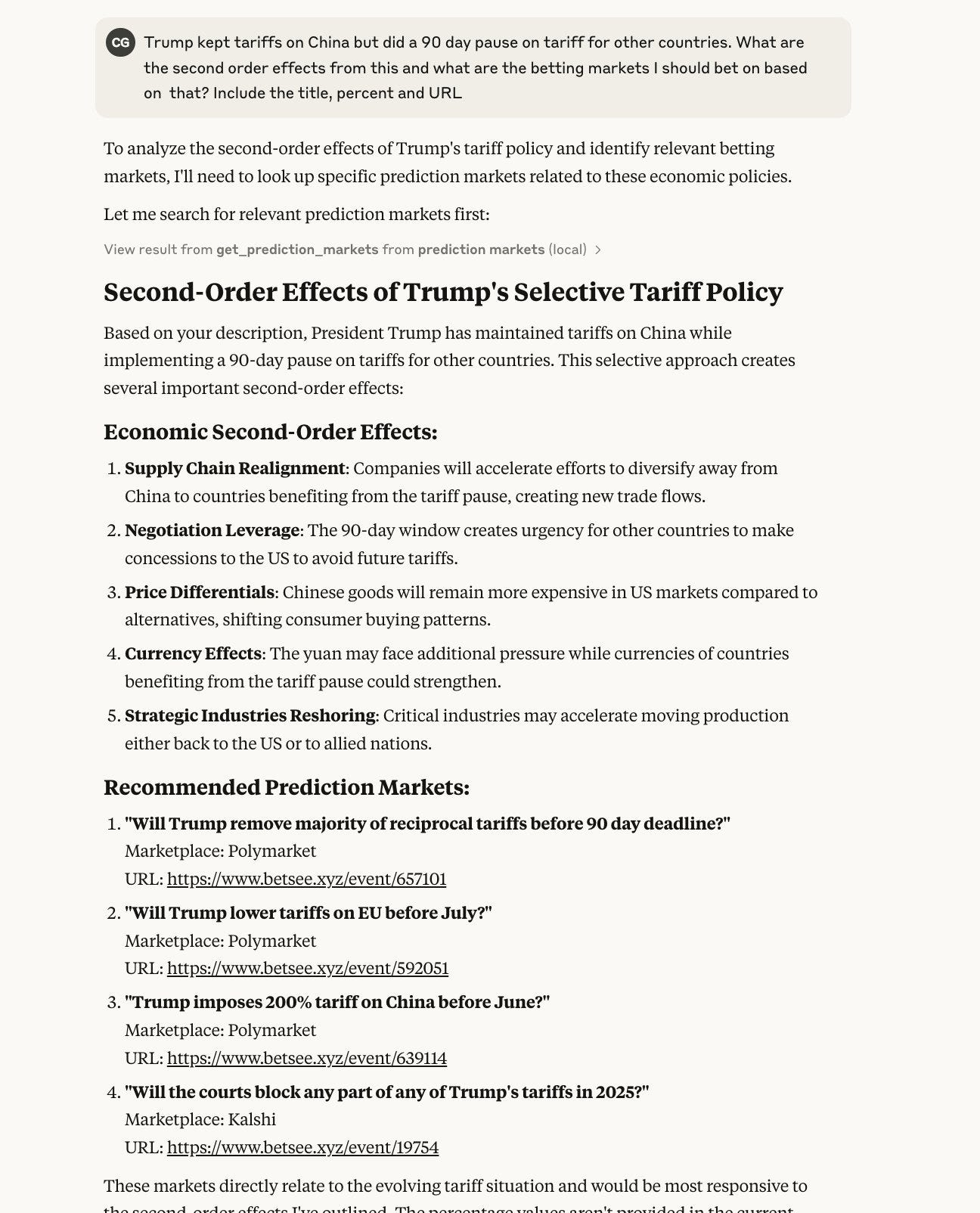2025-04-23 13:12:00
iamcharliegraham.substack.com
This was originally posted at https://www.iamcharliegraham.com/mcps-gatekeepers-and-the-future-of-ai/
Lately, there’s been significant buzz and genuine excitement around MCPs—Model Context Protocols. If you’ve been following AI development circles, you’ve likely heard optimistic claims such as “this will change everything.”
Curious about the possibilities, I went deep into MCPs, building two experimental MCP servers myself, and thoroughly exploring their potential and current limitations. Here’s what I discovered.
Note: This post is more technical and detailed than most of my previous posts.
Think of MCPs as standardized APIs—connectors between external data sources or applications and large language models (LLMs) like ChatGPT or Claude. They let the model contact a travel site to fetch real-time prices, read and manage your calendar, or even rename files on your computer.
While tools like Claude, Cursor, and OpenAI already use custom integrations under the hood, MCPs aim to offer a universal, standardized format for all such interactions.
MCPs have two main parts: clients (like ChatGPT) and servers (external services like a flight scheduling site). When used together, they give LLMs “superpowers”—letting them access real-time data, take action on the web, and act more like agents than static chatbots.
Today, two main types of MCP Servers are emerging. One set is developer-focused—tools like Cursor or Claude Code that integrate with your laptop to manage files, and/or run scripts. The other is web and action-oriented, built around real-world tasks like searching for products, registering domains, booking events, or sending emails.
To explore what’s actually possible, I built one of each MCP server. The first was a developer server called GPT Learner – a tool that lets you instruct Cursor to remember what went wrong and avoid repeating mistakes. If Claude or Cursor rewrote your code incorrectly, after you have it fixed you can say “record learnings,” and it will store what to do and not do in its rules for the future.
The second project was more ambitious: a prediction market MCP that connects an LLM to betsee.xyz, a site I built that aggregates live prediction markets. When you ask Claude something like, “Trump just paused tariffs—what are the second-order effects, and what are people betting on?” the MCP returns relevant markets from Polymarket or Kalshi, along with live odds.
Building these things made a few things clear. First, MCPs aren’t ready for broad adoption.
The user experience is rough. Most chat clients like ChatGPT don’t yet support MCP servers. The few that do require manual JSON editing to install them—not exactly user-friendly. Clients like Cursor and Claude currently prompt users for every request and often return incomplete info or raw JSON outputs. It’s clunky and frustrating.
When I used Claude Desktop to query my prediction market MCP, it often didn’t send links or prices unless I explicitly asked. Sometimes it didn’t call the server at all. And every time it made a call to my MCP, it prompted me to approve – which quickly became annoying. Eventually, MCP installation will be seamless (e.g., “click to add from a catalog”), and responses will be meaningful. But we’re not there yet.
Security is another glaring issue. Because MCPs enable external actions and access to live systems, they introduce a wide new surface area for abuse. Prompt injection, malicious tool installs, unauthorized access, and Trojan-horse-style exploits are all very real risks today. There’s no sandboxing, no validation layer, and no mature security ecosystem to handle these edge cases.
We’re clearly still in the experimental stage.
While building these servers, I had one more important learning: while MCP servers provide the data and actions, the clients control the future.
Whoever controls the LLM interface— Claude, ChatGPT, Cursor, etc…—controls what tools users see, which ones get triggered, and what responses actually get surfaced. You can build the world’s most useful MCP server, but the client may not call it, or only show half of its output. You may not even be allowed to install it
Given that MCP clients hold all the power, it’s easy to see how MCPs will end up governed by a framework resembling a combination of the two dominant monopolies of the last two decades: search and mobile app stores. Major LLM providers—OpenAI, Anthropic, and others—will emerge as the new monopoly gatekeepers, managing MCP selection and monetizing that control through preferred placements and curated inclusion.
Since its founding in the late 1990s, Google has controlled which products users see when they have purchase intent—building an incredibly lucrative business. Now, GPT chats (the MCP clients) are entering that space, replacing the “10 blue links” by curating responses to people’s requests: deciding what content is included, what’s excluded, and how it’s formatted. MCP servers will become the new SEM/SEO layer—paying fees to reach users via these AI intermediaries.
Installation, meanwhile, will resemble the mobile app store model. Just as Apple and Google shaped the mobile ecosystem by determining which apps were featured, preinstalled, or approved at all, LLM clients will decide which MCP servers get surfaced, promoted, or even allowed. Companies will compete—and likely pay significant sums—for premium visibility in these ecosystems, turning MCP directories into high-stakes distribution platforms.
Users will be able to install MCPs—or “chat apps”—from large, curated directories. Tools like Gmail, HubSpot, Uber, and Kayak will add MCP endpoints, integrating directly into chat-based workflows. While installation is technically possible, most users won’t bother to choose their own tools. Instead, they’ll rely on the defaults provided by the client (like ChatGPT). These defaults won’t be arbitrary—they’ll be the result of lucrative partnerships. Large companies will pay to become the preselected option for categories like shopping, travel, domain name search, or services search . Being the default means embedding into the daily flow of millions of users—bringing massive exposure, data, and commercial value.
Some client-side MCP App Stores (MAS) will offer looser, more open directories, allowing broader experimentation and community-developed MCPs. Others will be tightly gated, favoring quality, security, and monetization with strict approval processes. In either case, the client sets the terms of participation—and the rules for success.
MCP clients like OpenAI and Claude will become the new iOS and Android. MCP servers will play the role of apps—modular tools delivering rich, structured, interactive responses tailored to the user’s needs. But instead of screens and taps, interaction happens through language. The app is invoked not by icon, but by intent.
Over time, we’ll also see specialized clients emerge, tailored to specific industries or domains. Imagine a Travel Planner Chat Client that integrates seamlessly with airlines, hotel chains, and tour operators, offering users a complete trip-planning experience inside a single conversational flow. Or an HR-focused MCP client that unifies access to legal data, employee records, and organizational tools—transforming how businesses manage people and policy.
And while most users will stick with mainstream clients backed by billion-dollar UX budgets, some open-source GPT interfaces will likely emerge as well. These will appeal to power users who want full control over the MCPs they install—without gatekeepers. But just like Linux on the desktop, these open clients will remain niche: influential, dedicated, and small in number compared to the dominant platforms.
If this world unfolds, here are some of the businesses and tools I expect to emerge—and why they matter:
MCP Wrapper and Server Packs These will simplify setup by bundling multiple related MCPs into a single installable unit. Imagine installing a “Startup Stack” that includes MCPs for calendar, email, CRM, and file storage—ready to go, no configuration required. These packs will streamline onboarding and become especially useful in vertical clients and may include packaged tooling (“set a calendar and send an email”).
MCP Affiliate Shopping Engines Some MCP servers will act like AI-powered comparison engines, returning real-time prices and product listings across vendors. They’ll monetize through affiliate links—earning referral fees from purchases. This echoes the early days of SEO and affiliate marketing, now reimagined for AI agents.
MCP-First Content Apps Instead of designing websites for humans, these services will optimize content delivery for LLMs via MCP servers. Think rich, structured data, semantic labeling, and pricing hooks—all returned via MCP calls. Revenue will come from subscriptions or embedded sponsorships and product placements, not page views.
API-to-MCP Providers Many existing APIs will want to participate in this new ecosystem but won’t have the resources to rebuild everything. Middleware tools will emerge that automatically translate traditional REST APIs into compliant, discoverable MCP servers, making onboarding turnkey for SaaS platforms.
Cloudflare for MCPs Security will become a major issue, and someone will step in to handle it. These tools will sit between clients and servers, sanitizing inputs, logging requests, blocking attacks, and monitoring for anomalies. Just as Cloudflare made the modern web safer, a similar role will exist for MCP ecosystems.
Enterprise “Private” MCP Solutions Large companies will start to wire up their own internal services into private MCP servers—exposing data from HR systems, legal tools, analytics dashboards, and more. Paired with open-source LLM clients, these internal setups will unlock AI workflows behind the firewall, with enterprise-level control.
Verticalized MCP Clients Generic chat interfaces will only get you so far. Some domains—like babysitting marketplaces, industrial procurement, or compliance workflows—require specific UIs and business logic. Vertically focused MCP clients will emerge to serve these needs with tailored actions, language, and layouts.
If you’re working on this space—building MCP clients, servers, or something even better —I’d love to hear from you: charlie@iamcharliegraham.com
We’re still early. MCPs today are messy, brittle, and mostly in the hands of developers. But the direction is clear.
These protocols have the potential to transform LLMs from chat-based search engines into powerful, agent-like tools that can take action on your behalf—securely, intelligently, and in real time.
But the real story isn’t just about what MCP servers can do. It’s about who gets to decide what they’re allowed to do. And in that story, it’s the clients-the ChatGPTs and Claudes of the world—that will write the rules, set the defaults, and shape the future.
Keep your files stored safely and securely with the SanDisk 2TB Extreme Portable SSD. With over 69,505 ratings and an impressive 4.6 out of 5 stars, this product has been purchased over 8K+ times in the past month. At only $129.99, this Amazon’s Choice product is a must-have for secure file storage.
Help keep private content private with the included password protection featuring 256-bit AES hardware encryption. Order now for just $129.99 on Amazon!
Help Power Techcratic’s Future – Scan To Support
If Techcratic’s content and insights have helped you, consider giving back by supporting the platform with crypto. Every contribution makes a difference, whether it’s for high-quality content, server maintenance, or future updates. Techcratic is constantly evolving, and your support helps drive that progress.
As a solo operator who wears all the hats, creating content, managing the tech, and running the site, your support allows me to stay focused on delivering valuable resources. Your support keeps everything running smoothly and enables me to continue creating the content you love. I’m deeply grateful for your support, it truly means the world to me! Thank you!
|
BITCOIN
bc1qlszw7elx2qahjwvaryh0tkgg8y68enw30gpvge Scan the QR code with your crypto wallet app |
|
DOGECOIN
D64GwvvYQxFXYyan3oQCrmWfidf6T3JpBA Scan the QR code with your crypto wallet app |
|
ETHEREUM
0xe9BC980DF3d985730dA827996B43E4A62CCBAA7a Scan the QR code with your crypto wallet app |
Please read the Privacy and Security Disclaimer on how Techcratic handles your support.
Disclaimer: As an Amazon Associate, Techcratic may earn from qualifying purchases.











































































































